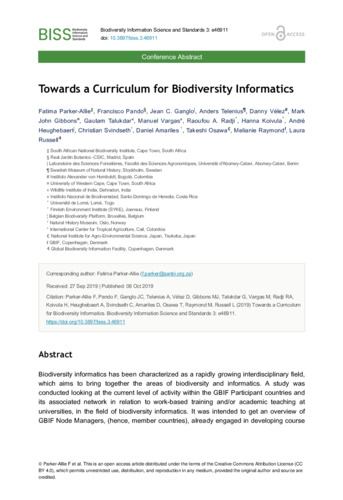Towards a Curriculum for Biodiversity Informatics
Biodiversity informatics has been characterized as a rapidly growing interdisciplinary field, which aims to bring together the areas of biodiversity and informatics. A study was conducted looking at the current level of activity within the GBIF Participant countries and its associated network in relation to work-based training and/or academic teaching at universities, in the field of biodiversity informatics. It was intended to get an overview of GBIF Node Managers, (hence, member countries), already engaged in developing course curricula, or in providing training, and whether they would be willing to share resources or enter into collaborations, to further elaborate this field of science.This investigation followed a survey approach, conducted globally across the GBIF community to identify the existing capacities and resources within the network. The results indicated that the vast majority of GBIF Nodes survey respondents, are engaged in onsite training activities in biodiversity informatics areas, with a focus on professionals, mostly researchers, policy makers and students. Training includes data digitization, management, publishing, analysis and use, to enable the accessibility of analogue and digital biological data which currently resides as scattered databases/datasets.A list containing the associated URL's for training and dissemination activities in GBIF Nodes has been developed, based on survey results, and will be presented. An initial assessment of the academic teaching activities indicated that many countries across most regions were already engaged in the conceptualisation, development and/or implementation of formal academic programs in biodiversity informatics including Benin, Colombia, Costa Rica, Finland, France, India, Norway, South Africa, Sweden, Taiwan and Togo. This study also identified that digital e-learning platforms were a very important tool to help build capacity in a number of countries.To assess the level of potential in the network to support academic teaching and work-based training, sixty percent indicated that they would be willing to be recruited or commissioned to support teaching activities, demonstrating the value of the Nodes network to support the development of biodiversity informatics globally. The contributions and activities of various nodes across the network will be highlighted and a working high-level curriculum framework will be discussed.

